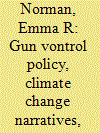|
|
|
Sort Order |
|
|
|
Items / Page
|
|
|
|
|
|
|
| Srl | Item |
| 1 |
ID:
186871


|
|
|
|
|
| Summary/Abstract |
At the time of writing this Editor's Note, it has been but a few weeks since the horrifying school shooting in Uvalde, Texas on May 24, 2022, that killed 19 children and two teachers, and the supermarket massacre of ten people in Buffalo, New York ten days earlier. Both lone gunmen were 18 years old and both used legally acquired AR-15-style weapons (Edmondson 2022). The events catapulted gun control debates again into the headlines and culminated in swift legislation proposals in Congress. On June 8, 2022, a bitterly divided House—voting largely along party lines—approved a stricter gun control bill package by 223 to 204 votes but also revealed the partisan chasm that continues to afflict passing effective firearms control legislation in the United States. Among other things, the bill would ban under-21s from legally purchasing semiautomatic rifles, increase requirements for gun storage in private households, and prohibit the sale of magazines holding over 15 rounds (Edmondson 2022). The acrimonious arguments in the House were predictably partisan with Democrats focusing on protecting children from gun violence while Republicans highlighted that the proposal would violate Second Amendment rights. Representative Jim Jordan (R-OH; cited in Edmondson 2022), opined that protecting children “is important—it sure is. But this bill doesn't do it. What this bill does is take away Second Amendment rights, God-given rights, protected by our Constitution, from law-abiding American citizens.”
|
|
|
|
|
|
|
|
|
|
|
|
|
|
|
|
| 2 |
ID:
186873


|
|
|
|
|
| Summary/Abstract |
Understanding the reasoning behind diverse views grows empathy and can help strengthen democracy. This study examines narratives and their influence on individuals, to see if individuals only empathize with narratives from those with whom they share identity. Using an experimental design, we test empathy with working class climate change narratives. Results showed participants who agreed with anthropogenic climate change, who were given both evidence and a narrative, empathized with the narrator (either an organic farmer or a mechanic) that told a pro-climate change narrative. The greatest empathy was for the mechanic telling a pro-climate change narrative. Conversely, participants who did not agree with human-caused climate change and who were given evidence without narrative had more empathy for the organic farmer (over the mechanic) who told a pro-climate change narrative. Overall, we found some identity issues negatively influenced empathy, but we also found examples where individuals moved beyond their identity.
|
|
|
|
|
|
|
|
|
|
|
|
|
|
|
|
| 3 |
ID:
145785


|
|
|
|
|
| Summary/Abstract |
This article seeks to explain through the contextualized comparisons of a few critical cases how national preferences on an interstate bargaining issue are formed domestically. It proposes an interaction framework of national preference formation (NPF), which emphasizes the government's policy autonomy, the size of the ruling party or coalition, and the party unity in aggregating divergent domestic preferences for interstate bargaining. The framework is tested against major European Community members' preference formation on Economic and Monetary Union (EMU). Case studies reveal that the interaction framework quite accurately describes the national preferences of Germany, Britain, and France over EMU.
|
|
|
|
|
|
|
|
|
|
|
|
|
|
|
|
|
|
|
|
|